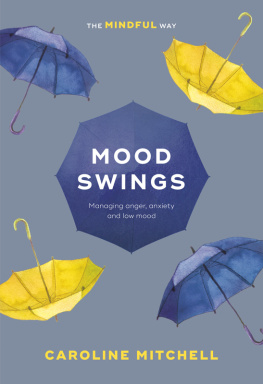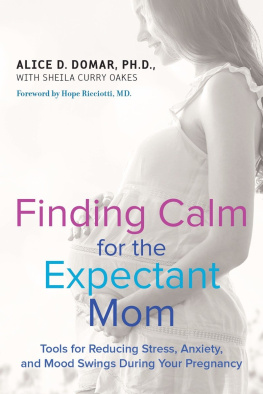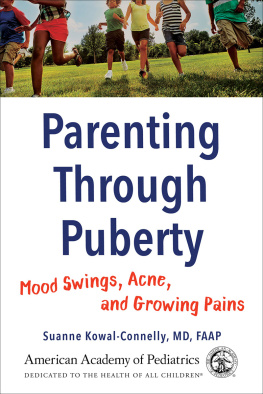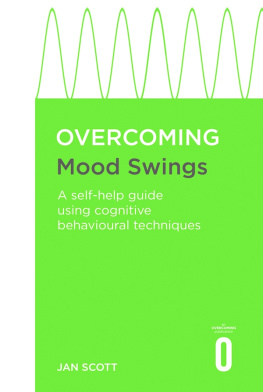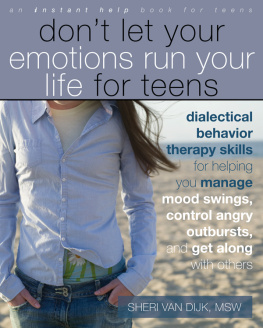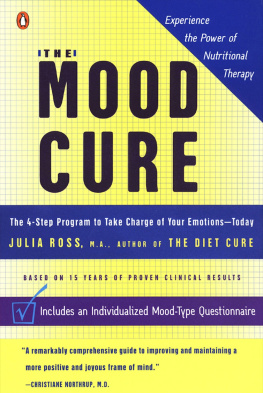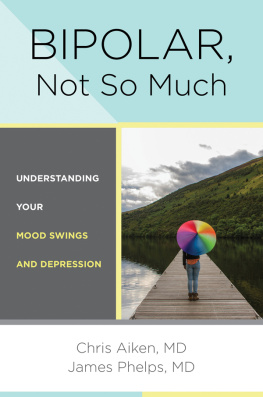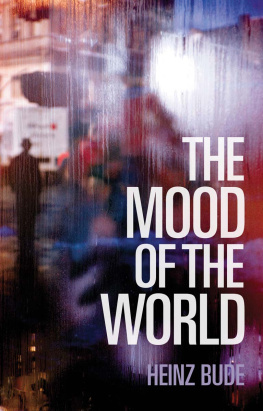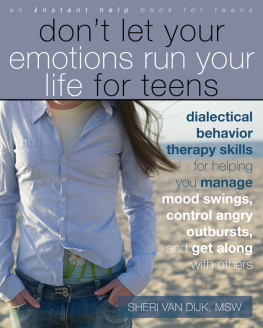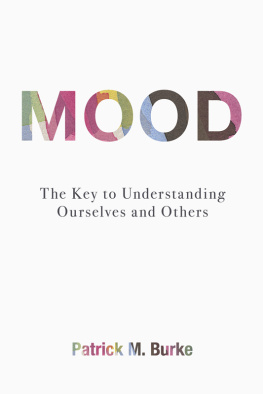
The Mindful Way
Mood Swings
Managing anger, anxiety and
low mood
CAROLINE MITCHELL

For Dad
First published in Great Britain in 2017
Sheldon Press
36 Causton Street
London SW1P 4ST
www.sheldonpress.co.uk
Copyright Caroline Mitchell 2017
All rights reserved. No part of this book may be reproduced or transmitted in any form or by any means, electronic or mechanical, including photocopying, recording, or by any information storage and retrieval system, without permission in writing from the publisher.
The author and publisher have made every effort to ensure that the external website and email addresses included in this book are correct and up to date at the time of going to press. The author and publisher are not responsible for the content, quality or continuing accessibility of the sites.
British Library Cataloguing-in-Publication Data
A catalogue record for this book is available from the British Library
ISBN 9781847094599
eBook ISBN 9781847094605
eBook by Fakenham Prepress Solutions, Fakenham, Norfolk NR21 8NN
First, I am indebted to Fiona Marshall at Sheldon Press for commissioning me to write this book. You have been amazingly supportive and wonderfully patient in answering my many questions, and have given me great guidance throughout! Thank you also to Eilidh McGregor and Rob MacRae for your great advice and support at the start of this process, to Ruth for your frank disclosures regarding your personal experiences with mood swings, and to Carol Walker for all your help and keeping me (relatively) sane. Finally, thanks to family and friends for their kind words of encouragement and accommodating my own individual mood swings during the writing of this book!
Have you ever reached over to grab the last piece of chocolate in a bar, only to find out youve already finished it, or gone upstairs to fetch something and forgotten what it was you wanted? My own personal nemesis was arriving at the supermarket minus shopping list (left on the kitchen table), forgetting about a third of what was on the list, then getting home and realizing my credit card was still in the card reader. Any of this sound familiar?
All the above are perfect examples of the kind of mindless behaviour we all exhibit regularly when were on autopilot and not paying attention to what were doing. Time and again, were not truly present in our daily lives as were so busy with work, family, friends and ever-increasing pressures coming at us from all sides that we dont notice whats going on around us and dont listen when our bodies are telling us to slow down. Its not surprising that so many of us find our moods are unpredictable and seem unmanageable.
Mindfulness teaches us to take time out and understand more about who we are, whats going on in our lives and what we want. Just concentrating on what we think and feel may not initially appear to offer a solution, but if we do this without judging ourselves or others, its a tremendously empowering experience and one that can change our lives for the better. Mindfulness helps us recognize what the triggers and warning signs are for our mood swings, so we can be more in control of them. Not only can mindfulness work wonders on our mood swings but it can also strengthen our relationships, improve our performance at work and give us a much-needed sense of calm.
Over the last decade or so, the popularity of mindfulness has grown substantially and many high-profile celebrities, including Oprah Winfrey, Davina McCall, Emma Watson and Angelina Jolie, have revealed that they practise it. Theres barely a week that passes without a mention of mindfulness in the press. For example, Greater Manchester Police offered some lunchtime mindfulness meditation sessions to its members of staff, have started up 15-minute mindfulness sessions for the children to help them learn self-regulation, calm them down and boost their spirits. The evidence base for mindfulness is steadily increasing, too, with many clinical trials already proving its efficacy and indicating that further research is warranted.
Anyone can take up mindfulness at any age. You dont need any qualifications, nor any particular equipment or special clothing to start. You just need somewhere comfortable to sit and a bit of peace and quiet.
This book is a guide to how to handle your mood swings better with mindfulness, and is suitable for people with no prior experience of mindfulness as well as those who have previously dabbled. It takes a look at what mood swings are and how they can affect us, explains what mindfulness is and how it works, discusses how mindfulness can help with mood swings, offers some practical mindfulness exercises for you to follow in relation to your mood swings and, finally, suggests a few simple lifestyle changes that may help. The information given here about mood swings is an overview of what can be a complex mechanism of interacting processes and is not intended to replace medical advice or diagnose any medical or psychological condition, so if you have any concerns, please consult your GP.
What are mood swings?
We all have mood swings they are a natural part of life. At their simplest, mood swings are just a change in how you feel. We have all experienced a shift in our mood from angry to relieved, happy to sad, lively to lethargic. Such shifts can vary in intensity from subtle and barely noticeable to extreme and all-consuming. Mood swings can happen when youre just having a bad day, are nobodys fault and normally subside over time. A certain amount of stress is inevitable and can be a good thing, as it motivates us to get things done and achieve deadlines. More problematic are mood swings that become extreme, change rapidly and start to interfere with your daily functioning, often having an impact on others lives too.
Who gets mood swings and what causes them?
As we have seen, anyone can get mood swings. They may occur in response to a particular trigger, be caused by a combination of factors or just come out of the blue. Statistics for mood swings are hard to determine, as people tend not to visit their GP specifically to talk about mood swings, but the UK-based mental health charity Mind estimates that 1 in 4 people in the UK experiences a mental health difficulty of some kind each year.
Several theories have been proposed as to what it is exactly that causes mood swings. Many researchers believe an imbalance in neurotransmitters (chemicals in the brain, such as serotonin, dopamine, noradrenaline and gamma-aminobutyric acid GABA) cause mood swings, and several brain-imaging studies indicate that the structure and function of the brain differs in people with mood disorders. Many people get low moods as winter approaches, which is likely to be related to the reduction in sunlight, or there may be a genetic tendency towards mood swings. Equally, it might just be that mood swings are part of your personality.
Significant life events
Mood swings are much more common when we experience bereavements, job changes, conflicts, relocation, parenthood, separation or divorce, as it takes time to adjust to a new and sometimes unwanted lifestyle. Longer-term mood swings are likely to occur at times of chronic stress caused by unresolved sexual, emotional or physical traumas.
Lack of sleep
People who do not get enough sleep are generally more irritable and emotionally volatile as a result. Researchers investigating the relationship between insomnia and bipolar disorder have demonstrated that sleep deprivation causes increased activity in the amygdala, which is a key area in the brain responsible for processing emotional reactions, including anxiety and aggression. They have further suggested that the rapid eye movement (REM) phase of sleep, known to be negatively affected by insomnia, is vital for processing emotions.
Next page
